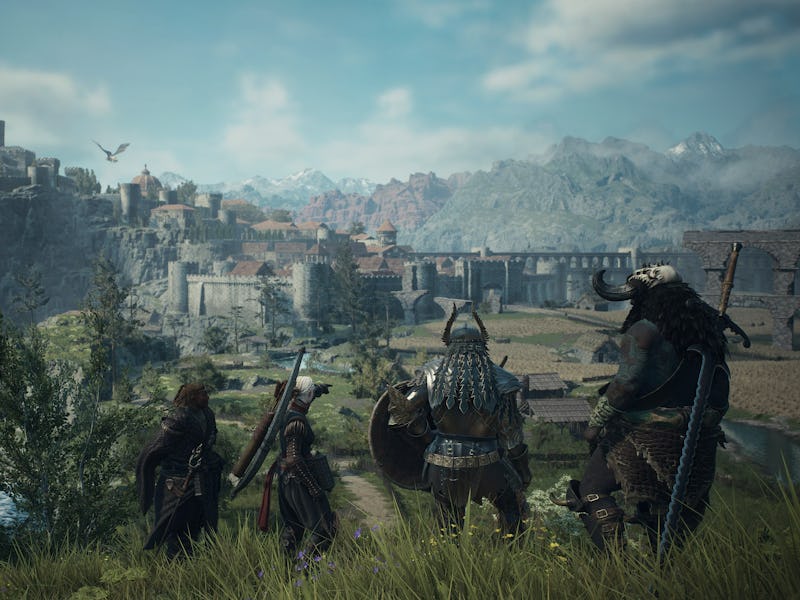Dragon’s Dogma 2 Makes Camping More Exciting Than Slaying Monsters
Every step counts.

Flawed though it is, I’ve loved Dragon’s Dogma since the first time I picked it up 10 years ago. So I was excited for Dragon’s Dogma 2, to say the least, but as its release approached, I started to worry that it wouldn’t capture the original’s magic. My fears were proven unfounded almost immediately. Dragon’s Dogma 2 doesn’t just replicate the joy of the original game, it exceeds it — evoking a true feeling of adventure in a way that no other game has.
When I talk about adventure in Dragon’s Dogma 2, I’m talking specifically about the feeling of going on a perilous journey, and all the moment-to-moment decisions that comprise it. Adventure isn’t just about slaying a dragon, it’s spending days on the road making your way to the beast’s lair. Most games focused almost entirely on the dramatic clash of swords at the end of quest, but Dragon’s Dogma 2 shines in everything leading up to that.
Sure, fighting a dragon is cool, but let’s talk about camping.
You start Dragon’s Dogma 2 directionless and underequipped. After a dramatic escape from a slave labor camp, you’re plopped down in the wilderness with little more than the clothes on your back. Your first few quests are likely carting herbs and other other minor items between NPCs. Soon enough, you’ll be directed to slay a dragon and unravel nefarious political machinations in the kingdom of Vermund, but before you can do that, you’ve got a lot of walking to do.
Most of my time in Dragon’s Dogma 2 was spent walking. That’s largely due to its restrictive fast travel, a system that single-handedly makes the game’s sense of awesome adventure possible. In short, you need to spend a rare, single-use ferrystone every time you fast travel, or take a slow oxcart that’s likely to collapse along the way. Otherwise, you’re hoofing it. And since the clock is always ticking, day inevitably turns to long, dark night as you walk.
I still remember the first night I camped out in Dragon’s Dogma 2. I was on an early quest to help a man find his missing brother, which took me further from the safety of settlements than I’d been up to that point. As darkness fell, we were assailed by goblins. Low level and still shaky in combat, I barely made it out of the encounter alive, as goblins leapt from every angle out of the pitch-black woods. Taking as much damage as I did reduces your maximum health, and the only way to get it back is to rest.
Every fight you have can leave you less prepared for the next one.
Fortunately, the party soon came across the embers of a campfire, with a camping kit handily placed beside it. I set up camp and dozed off for a restful night — only to be awoken by another pack of goblins who beat us to a pulp and destroyed our tent. Now with no way to rest, we were forced to limp on, finishing the quest through sheer luck with a sliver of remaining health.
That awful night is emblematic of why I love Dragon’s Dogma 2. I went into a situation unprepared, it went worse than I could have anticipated, and I narrowly came out the other end with a much better story because of it. If night weren’t so terrifying, if maximum health didn’t deplete, if tents weren’t required and fragile, I would have had a much easier time, but I would have forgotten it immediately. That’s the essence of adventure in Dragon’s Dogma 2.
The more I play, the more I kept thinking of Netflix’s recent fantasy anime series Delicious in Dungeon. Like Dragon’s Dogma 2, the anime starts with a quest to slay a dragon, but both become stories about preparation, rest, and cooking meals around a fire.
Hulking monsters await with every step of your journey.
As I learned that first night camping, preparedness is key, and choosing the right way to travel can totally change what happens on the road. Taking an extra camping kit can be helpful in case yours is destroyed, but they’re so heavy that means sacrificing space for dozens of other useful items. Carrying meat means you can cook dinner when you camp and get stat boosts, but if you don’t use it, it will quickly spoil.
While Dragon’s Dogma 2’s version of adventure has a lot to do with the minutiae of inventory management, it has more spectacular moments, too. There are no straight lines on your journey. Every time you set off on a quest, it means choosing which path to take, and more often than not, the path is more complicated than it looks. A short distance on the game’s map can translate to an hours-long journey, as the bridge broken by a cyclops and the harpy that drops you off a cliff as you fight it aren’t marked there.
The potential for unexpected encounters always hangs over you, and more often than not, Dragon’s Dogma 2 makes good on that threat. Around every corner, there’s the chance to encounter an enemy too tough to defeat, a game-changing piece of equipment, or a whole new area to explore. There’s no way to predict what will happen next in Dragon’s Dogma 2, and no trip is ever straightforward. What makes it an adventure is that the journey is almost always more interesting than the destination, and the harder the road is, the more fun you’ll have reciting the tale in the end.